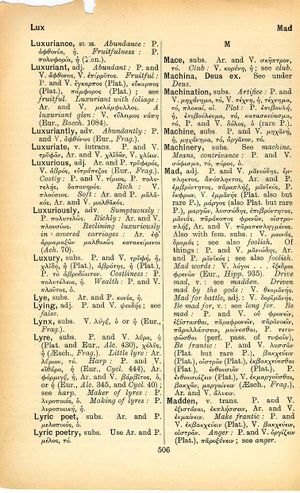mad
ὦ διάνοια, ἐὰν ἐρευνᾷς τοὺς ἱεροφαντηθέντας λόγους μὲν θεοῦ, νόμους δὲ ἀνθρώπων θεοφιλῶν, οὐδὲν ταπεινὸν οὐδ᾽ ἀνάξιον τοῦ μεγέθους αὐτῶν ἀναγκασθήσῃ παραδέχεσθαι → if, O my understanding, thou searchest on this wise into the oracles which are both words of God and laws given by men whom God loves, thou shalt not be compelled to admit anything base or unworthy of their dignity
English > Greek (Woodhouse)
adj.
P. and V. μανιώδης, ἔμπληκτος, ἀπόπληκτος, Ar. and P. ἐμβρόντητος, παραπλήξ, μανικός, P. ἔκφρων, V. ἐμμανής (Plat. also but rare P.), μάργος (also Plat. but rare P.), μαργῶν, λυσσώδης, ἐπιβρόντητος, μανιάς, παράκοπος φρενῶν, οἰστροπλήξ, Ar. and V. παραπεπληγμένος. Also with fem. subs.; V. μαινάς, δρομάς; see also foolish. Of things: P. and V. μανιώδης, Ar. and P. μανικός; see also foolish. Mad words: V. λόγοι . . . ἔξεδροι φρενῶν (Eur., Hipp. 935). Drive mad, v.: see madden. Driven mad by the gods: V. θεομανής. Mad for battle, adj.: V. δοριμανής. Be mad for, v.: see long for. Be mad: P. and V. οὐ φρονεῖν, ἐξίστασθαι, παραφρονεῖν, παρανοεῖν, παραλλάσσειν, μαίνεσθαι, P. τετυφῶσθαι (perf. pass. of τυφοῦν). Be frantic: P. and V. λυσσᾶν (Plat. but rare P.), βακχεύειν (Plat.), οἰστρᾶν (Plat.), ἐκβακχεύεσθαι (Plat.), ἐνθουσιᾶν (Plat.), P. ἐνθουσιάζειν (Plat.), V. ἐκμαργοῦσθαι, βακχᾶν, μαργαίνειν (Aesch., Frag.), Ar. and V. ἀλύειν.

